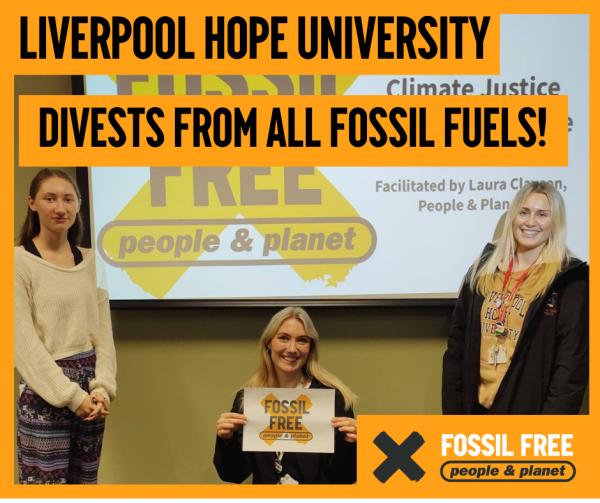Today, Liverpool Hope University has publicly committed to exclude fossil fuel companies from any investment holdings. This makes it the 109th UK University to go Fossil Free.
Liverpool Hope University committed to Fossil Free by adding their name to NUS and People & Planet’s Fossil Free Declaration. The Declaration exists for universities who wish to affirm that they currently hold no fossil fuel company investments, and commits signatories to ensuring that they never do. The Declaration states that “cutting ties'' with the industry “is a common sense decision,” given “the fossil fuel industry is a leading contributor to climate change.” It also declares that “remaining fossil free” is “an act of solidarity with the frontline and Indigenous communities disproportionately impacted by both climate change and the extractivist projects of fossil fuel companies.”
Liverpool Hope is a post-92 university with around 5,000 students. Students began campaigning for the university to go Fossil Free in 2021, as part of a national campaign training programme organised by student-led charity People & Planet, which targeted post-92 institutions. Across the course of the three year campaign that followed students set the stage for this Fossil Free win through collecting petition signatories, working alongside on-campus trade unions, negotiating with university management and cementing a strong relationship with the Students’ Union. It was a coalition between Liverpool Hope Students' Union and the grassroots student Environmental Society that pushed this victory over the line.
In addition to being an exciting victory due to Liverpool Hope belonging to the ever-increasing number of post-92 universities committing to Fossil Free, it is an amazing win for the city of Liverpool at large, as all of its universities have now committed to exclude fossil fuel companies from their investment holdings.
Building on this success, student campaigners are now calling on Liverpool Hope University’s careers services to exclude oil, gas and mining companies from student and graduate recruitment opportunities. This campaign, Fossil Free Careers, sees students continue to sever the relationships between their universities and the fossil fuel industry through ending recruitment pipelines into the extractive industries they say are most responsible for environmental destruction.
Laura Clayson, Climate Campaigns Manager at People & Planet, said: “It has been amazing to witness and support the hard work of the student organisers who have secured this incredible win at Liverpool Hope University. Universities are a site of power in the struggle against an industry that is both driving the climate crisis and forcing frontline and Indigenous communities to continually resist ongoing, destructive extraction operations on their lands. Severing institutional investment ties are a vital act of solidarity with these communities and I look forward to seeing the industry excluded from Liverpool Hope’s recruitment opportunities next.”
Liverpool Hope Students' Union Representatives Ella Taylor, Vice-President Welfare and Community, and Ellie Baldwin, Student Sustainability Representative: "We're thrilled to announce that Liverpool Hope has signed the Fossil Free Declaration. Many thanks to Mel and Ebony, who started the campaign in 2021, and to former VP Welfares Stephanie and Liv for their work on the campaign. This is a much needed positive step forward for Hope's role in tackling climate change. We look forward to further improving the University's environmental credentials with a commitment to Fossil Free Careers next."
Professor Claire Ozanne, Vice Chancellor at Liverpool Hope University said: "I am delighted to confirm that we have no investments in extractor fossil fuel companies and will continue to exclude them from any future investments that the University makes. The University's Strategic Plan sets out our commitment to achieve environmental sustainability and includes addressing it in the curriculum, delivering carbon net zero targets across our portfolio and stewarding our local environment to reduce and mitigate our footprint on the natural world."
